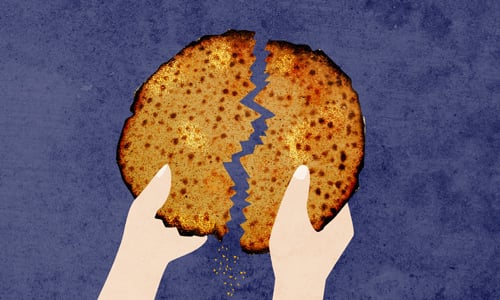One of the favorite moments for many at the Seder is the hiding of the Afikomen, and the children finding, holding it ransom until a proper prize is given in exchange for this “dessert” without which the Seder cannot end.
What in fact makes this Afikomen so important, and why indeed is it called dessert (translation of the word Afikomen)?
To appreciate all this we must step back a moment and examine all the different parts. The Afikomen is made of the broken pieces of the middle Matzah, that occurs during the fourth step of the seder, yachatz.
We take the broken pieces of the bigger half and hide it for the afikomen. The mystics compare this matzah to the essence of our lives and selves. Our inner broken pieces correspond to our inner brokenness and often we hide those issues away for examination at a later time. Isn’t that how most of us choose to deal with our inner issues? Kick it under the rug and hope it will go away and not come back to haunt us?The whole theme of the Seder is not only to recall the original story of exile to redemption but to go from our personal exiles into redemption,
The funny thing about children is that they expose our greatest weaknesses and shortcomings, and will also, at times, reveal our greatest traits, patience, empathy, compassion and love. The honesty and bluntness they convey, their demanding ways and often downright painful journeys they put us through break us, and also challenge us to find our most inner strength and summon up the reservoir of awesomeness and to see their soul not their body and behavior. They will challenge us to look at what is getting triggered in us by their behavior and work to heal those traits. The broken matzah represents our inner parts that are no longer whole and are in need of examination and repair.
Most of us, however, would rather not look at that too closely and would rather hide it away and pretend it doesn’t exist. Still, when and how do we heal from this brokenness? When does this brokenness turn from pain into blessing? Only after we confront what is bothering us, what is incomplete inside, leave our personal exiles by doing the work and step by step (of the Seder) look at what bothers us, make the necessary changes and with hard work and dedication, be released from that brokenness.
Only then, does this very same brokenness, (shrapnel made up of broken matzah) turn from a curse to a blessing. A blessing so profound that it is now the essential ingredient needed to close out the seder entitled Afikomen/dessert.
There is no greater blessing than when we can heal our inner wounds and realize that as painful as our challenges and hurts are, they are only there to bless me. To make me greater. To help me find my inner awesomeness. This is the secret of the Afikomen, and this is why it is worth the high price paid to ransom it back from the children.
The children reveal our weaknesses, but that is a reason to thank them and reward them. For if we step into our greatness and see our shortcomings and resolve to improve them, everyone leaves the experience enriched by it and their life is immeasurably improved.
The famous story of Jacob wrestling with the Angel of Esau comes to mind. They fought all night long and when it came time for the angel to go up to heaven to sing the morning prayers, and the two were stuck in a deadlock, the angel pressed Jacob to release him.
Jacob said the famous words, “I won’t let you go until you bless me.” At which point the angel blesses Jacob with the added name Yisroel. The question that frustrates commentators is why would Jacob even want a blessing from the “enemy” forces?
One answer given by the Chassdic Masters is that when you are in a situation where you are being hurt, even abused and beaten, and you feel broken, you cannot let that situation go until there is a blessing that comes as a result of the challenge.
Remember that line, “don’t let a good crisis go to waste?” That was stated in politics, but in religion it means, if there is a crisis, it is there to teach you something, to help you gain something as a result of it.
Returning to our broken matzah, it is only there so that at the end it will turn into dessert. Our brokenness that our children expose is only to help us find our inner greatness and turn it into a blessing.
Enjoy your Afikomen in a whole new way this year!
Happy Pesach!
Have a great Shabbos!
Rabbi Mendel Schusterman
Thanks to my brother, Rabbi Nechemia Schusterman, Chabad Peabody, Massachusetts, for sharing the above thought.


Recent Comments